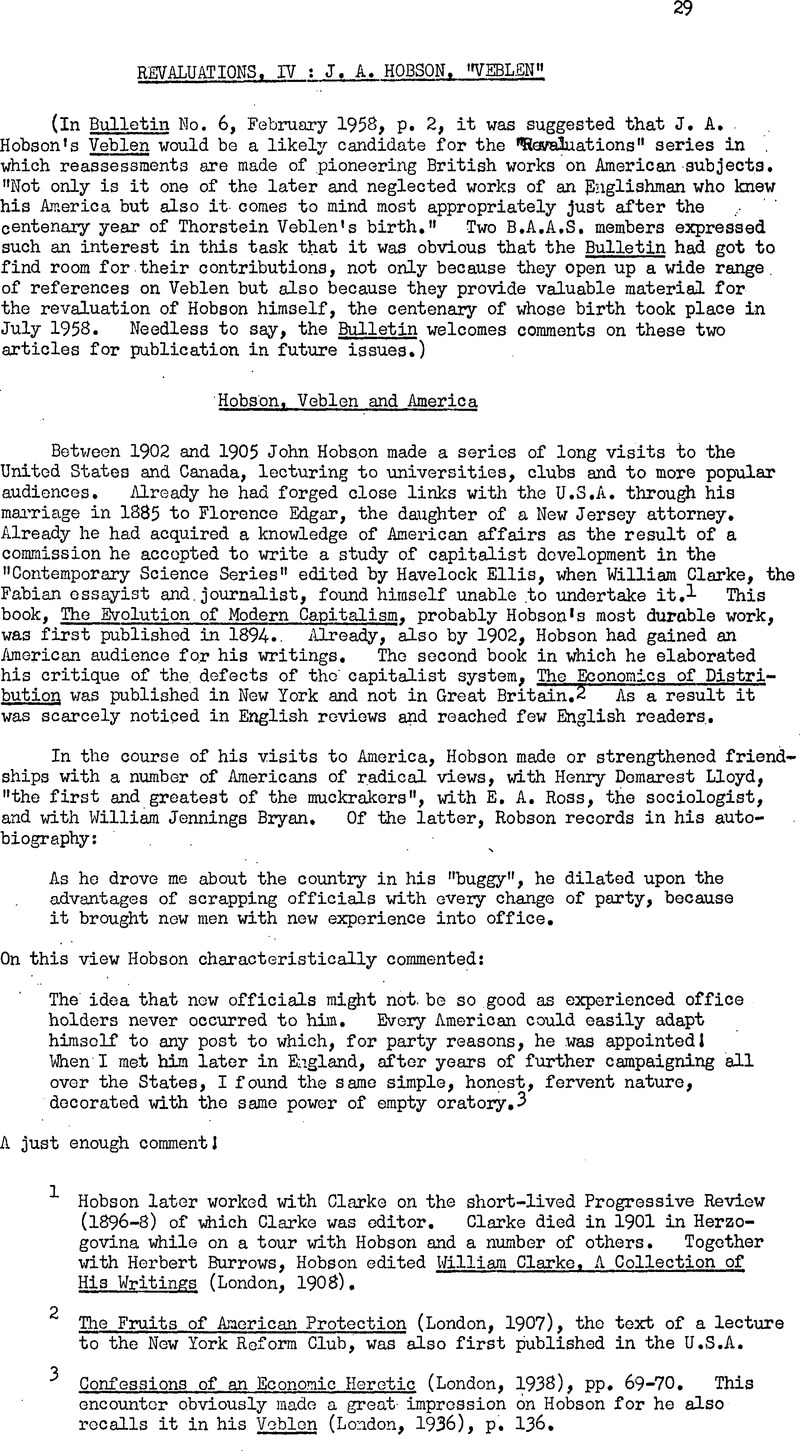Published online by Cambridge University Press: 17 February 2011

page 29 note 1 Hobson later worked with Clarke on the short-lived Progressive Review (1896–8) of which Clarke was editor. Clarke died in 1901 in Herzogovina while on a tour with Hobson and a number of others. Together with Burrows, HerbertHobson, edited William Clarke, A Collection of His Writings (London, 1908).Google Scholar
page 29 note 2 The Fruits of American Protection (London, 1907)Google Scholar, the text of a lecture to the New York Reform Club, was also first published in the U.S.A.
page 29 note 3 Confessions of an Economic Heretic (London, 1938), pp. 69–70.Google Scholar This encounter obviously made a great impression on Hobson for he also recalls it in his Veblen (London, 1936), p. 136.Google Scholar
page 30 note 1 In an unpublished letter. This phrase is quoted in Homan, Paul T.Contemporary Economic Thought (New York, 1928), p. 296.Google Scholar
page 30 note 2 Confessions, p. 69.
page 30 note 3 Dorfman, JosephThorstein Veblen and His America (New York, 1934) p. 222.Google Scholar
page 30 note 4 Confessions, p. 67.
page 30 note 5 Evolution of Modern Capitalism, pp. 236, 246, 253, 254.
page 30 note 6 And developed in The Industrial System (London, 1909).Google Scholar
page 31 note 1 Veblen, p. 139.
page 31 note 2 Reprinted in The Place of Science in Modern Civilisation and Other Essays (New York, 1919).Google Scholar Earlier, in 1884, he had written an article on Kant's Critique of Knowledge.
page 31 note 3 What Veblen Taught, ed. Mitchell, Wesley C. (New York, 1936).Google Scholar
page 32 note 1 Veblen, p. 55.
page 32 note 2 Ibid., p. 78.
page 32 note 3 Ibid., pp. 129–130.
page 32 note 4 Ibid., pp. 122, 132.
page 32 note 5 Imperialism (3rd ed. London, 1938), p. 224.Google Scholar Yet in the Introduction to this edition (p. xxiv) he stated that “the one apparent exception to the general trend of Imperialism is the United States.”
page 33 note 1 The most direct influence has possibly been on writing about fashions. See, for example, Bell, Q.On Human Finery (London, 1948).Google Scholar
page 33 note 2 See, for example, Mr. Harrod's criticism of Hobson's idea of “the unproductive surplus” in Hobson, J. A.The Science of Wealth (4th ed. revised by Harrod, R. F.London, 1950).Google Scholar
page 33 note 3 Brailsford, H. N.The Life-Work of J. A. Hobson, L. T. Hobhouse Memorial Trust Lecture No. 17 (London, 1948), p. 13.Google Scholar
page 33 note 4 See Hutchinson, T. W.A Review of Economic Doctrines 1870–1929 (London, 1953), p. 129.Google Scholar
page 34 note 1 On Native Grounds (New York, 1942), p. 133Google Scholar.
page 34 note 2 From his obituary notice in Economic Journal, L (1950), p. 359. (See also G. D. H. Cole, “J. A. Hobson”, New Statesman, 5 July, 1958, p. 12.) Nor is Cole's a solitary verdict. See also, for example, the entry in the Dictionary of National Biography by R. H. Tawney, and H. N. Brailsford, The Life-Work of J. A. Hobson. For a somewhat less favourable verdict, see Chesterton, G. K., Autobiography (London, 1936), pp. 271–272.Google Scholar
page 34 note 3 See Galbraith, J. K., The Affluent Society (London, 1958), p. 42Google Scholar and Commager, H. S., The American Mind (New Haven, 1950), pp. 227–246.Google Scholar
page 34 note 4 In his General Theory of Employment, Interest and Money, J. M. Keynes paid a generous tribute to Hobson's work, saying that the publication of The Physiology of Industry marks, in a sense, “an epoch in economic thought”. No mention of Hobson's work is to be found in Eric Roll's History of Economic Thought (1st ed. 1938, 2nd ed. 1945) but already a surer appreciation of his work is to be found in Hutchinson, Review of Economic Doctrines (1953).